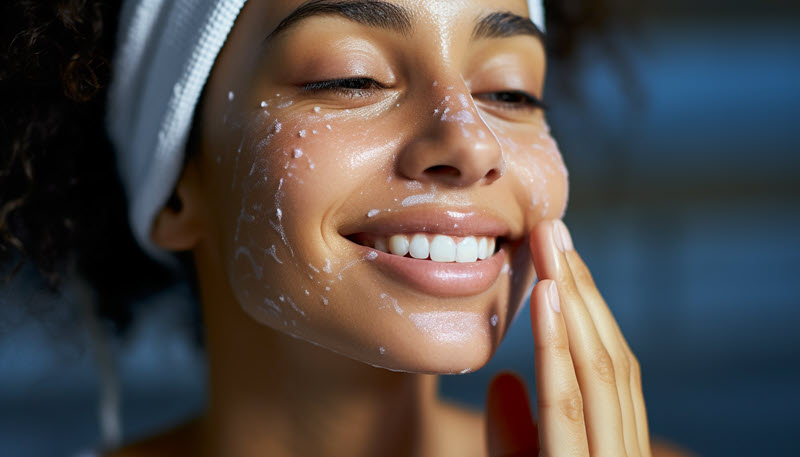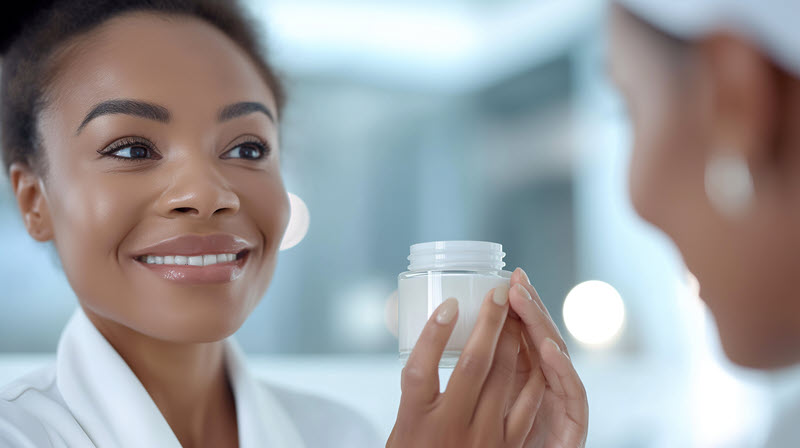Trillions of microorganisms populate our bodies. Most are found in the gastrointestinal system and on our skin, building an intricate gut-skin axis which profoundly impacts our wellbeing. In a healthy person, beneficial bacteria prevail, helping to prevent oxidative damage, strengthen skin barrier function, offset infections, and maintain overall health.
Recent research demonstrates probiotics’ vital role in balancing microbial homeostasis. This article explains how probiotics for the skin work, how to use them, and what products deserve attention.

What Are Probiotics for Skin?
Probiotics for the skin are foods, dietary supplements, and topical products formulated with select beneficial bacteria and yeasts. They improve the balance of healthy microorganisms naturally found in the body by preventing the overgrowth of potentially harmful ones. A healthy microbiome helps maintain a strong skin barrier and reduce inflammatory skin conditions.
Probiotics for Skin Benefits
Probiotics for the skin provide the following benefits:
- Improved barrier function
- Reduced inflammation
- Decreased oxidative damage
- Blocked pathogens and fewer skin infections
- Reduced transepidermal water loss
- Improved immune response
Do Probiotics Help Aging Skin?
Aging, genetics, environmental factors, and stress dehydrate the skin, compromising its barrier and leading to skin aging signs – wrinkles, hyperpigmentation, and loss of skin elasticity. Probiotics help by supporting beneficial bacteria like Lactobacillus plantarum, which produce essential compounds to strengthen the skin barrier. These bacteria enhance hydration by increasing ceramide production, offer natural UV protection, and release antimicrobial peptides to prevent the growth of harmful bacteria. Together, these mechanisms build a more resilient skin barrier, reduce sun damage, and promote a smoother, firmer complexion.
Do Probiotics Brighten the Skin?
Probiotics help increase cell turnover (shedding dead skin cells), revealing fresher, brighter skin. They may also improve pigmentation and enhance the skin’s natural brightness by inhibiting the activity of tyrosinase enzymes which increase melanin production.
Do Probiotics Clear Acne?
Acne typically appears due to hormonal changes that cause increased sebum production and clogged pores. Recent studies suggest a lack of diversity in gut microbiota, specifically the Cutibacterium acnes, can also trigger acne breakouts.
Common topical treatments for acne include salicylic acid, benzoyl peroxide, topical retinoids, etc. Probiotics are emerging as a promising new solution. By improving skin microflora, they may minimize lesion concentration, reduce redness associated with breakouts, and improve skin immunity.
Note: Try these holistic acne treatments to avoid the potential side effects of potent acne medications.
Do Probiotics Reduce Eczema?
Eczema is a chronic, inflammatory skin condition typically caused by genetics, compromised skin barrier function, and environmental pollutants. It manifests as dry, itchy skin that flares up in contact with irritants.
Eczema is associated with a prevalence of the bacteria Staphylococcus aureus, which causes disruptions in the skin barrier and weakens immune cells. Topical probiotics increase ceramide levels, combat S. aureus, and reduce eczema symptoms – scaling, itching, and redness.
Do Probiotics Help with Rosacea and Psoriasis?
Rosacea and psoriasis are inflammatory skin disorders causing rashes and other uncomfortable skin changes. They appear due to an imbalance in the gut and skin microbiome. Oral probiotic therapy helps restore bacterial homeostasis and alleviate these conditions, but the effectiveness of topical treatments is still being studied. Scientists assume the direct application of probiotics on the skin helps by restoring normal skin flora, generating antimicrobial peptides that eliminate pathogens, and improving skin barrier function.
Note: Learn more about rosacea, which intestinal bacteria cause it, and what natural treatments can help.
Do Probiotics Clear Dandruff?
Dandruff is a common skin disorder caused by an overgrowth of certain fungi in sebum-rich areas of the skin and scalp. The condition is typically treated with anti-dandruff shampoos, but probiotics show a promising therapeutic potential. They help increase hydration, restore barrier function, and balance sebum production, helping to reduce dandruff.
Do Probiotics Help Heal Wounds?
Recent research has found that the bacteria Lactobacillus plantarum residing in the skin inhibits skin inflammation after an injury and enhances wound recovery. The following properties make L. plantarum beneficial for wound healing:
- Anti-inflammatory properties: Lactobacillus plantarum has been shown to reduce inflammation, which is crucial in the wound healing process. By modulating inflammatory responses, it helps create a more favorable environment for tissue repair.
- Enhanced skin barrier function: This probiotic strain supports the skin barrier by promoting the production of antimicrobial peptides and enhancing the integrity of skin cells. A strong skin barrier is essential for preventing infections and facilitating healing.
- Promotion of collagen synthesis: L. plantarum can stimulate the production of collagen, a vital protein in the wound healing process. Increased collagen synthesis aids in tissue regeneration and improves the overall strength of the healed area.
- Antimicrobial activity: This strain exhibits antimicrobial properties that help combat harmful bacteria in the wound area. By reducing the risk of infection, L. plantarum contributes to a smoother healing process.
- Modulation of the skin microbiome: L. plantarum can help restore and maintain a healthy balance of the skin microbiome. A balanced microbiome is essential for optimal skin health and can prevent the overgrowth of pathogenic organisms that may impede healing.
- Moisture retention and hydration: L. plantarum has been associated with improved skin hydration, which is important for wound healing. Adequate moisture levels help facilitate cell migration and tissue repair.
- Clinical evidence: Emerging research supports the topical application of L. plantarum for wound healing, demonstrating its effectiveness in promoting faster recovery and improved outcomes in various types of wounds.
Oral supplements, topical gels, and fermented products with probiotics show potential in stimulating the healing process.
Can Probiotics Help Treat Skin Cancer?
Early-stage research suggests probiotics may help reduce the risk of skin cancer by preventing inflammation, oxidative damage, and a cancer-promoting environment. They also have photoprotective properties, further protecting from melanoma.
How to Start Using Probiotics for Skin

The safest way to start using probiotics is to introduce them into your diet plan. Fermented foods are the best nutritive source of probiotics. Excellent sources of beneficial bacteria are sauerkraut, pickles, yogurt, kefir, kombucha, miso, tempeh, kimchi, and sourdough bread. These foods also provide many other health benefits, like improved immunity and cardiovascular function.
However, a quicker solution for improving your microbiome requires a higher concentration of probiotics, as found in dietary supplements and cosmetic products. Start by consulting an experienced medical skin professional who will recommend products based on your unique skin and health condition.
Should I Use Probiotics in the Morning or at Night?
There is no consensus on the best time for a probiotic. Some probiotic strains in supplements are best taken before breakfast, and others may offer better results if taken at night.
Topical products with probiotics are typically used once or twice a day, in the morning and evening, depending on other ingredients. Read labels on skincare products and supplements to learn how and when to use them.
Fermented foods can be a part of your every meal.
Which Probiotic Is the Best for Skin?
Different probiotic strains help with different symptoms. The following are frequently used oral and topical probiotics in skin care:
- Lactobacillus plantarum
- Bifidobacterium longum lysate
- Vitreoscilla filiformis
- Lactococcus lactis lysate
Note: Our new skincare line, Vibrant, is formulated with microbiome-friendly ingredients such as Lactobacillus ferment and Lactobacillus plantarum, the most researched probiotic strains with proven health benefits.
How to Choose a Probiotic for Skin?
Choosing a suitable probiotic for the skin requires researching different probiotic strains and their properties, evaluating products, and preferably asking a skin professional for help.
Some factors to consider include:
- Individual microbiome variability: Each person's microbiome is unique, influenced by genetics, diet, lifestyle, and health history. Some probiotic strains may not be compatible with an individual’s specific microbiome, potentially leading to inflammation or adverse effects.
- Potential for inflammation: Certain probiotic strains, especially those not commonly found in an individual's gut, may provoke an inflammatory response. It's essential to choose strains that are known to be well-tolerated and beneficial for the majority of people.
- Autoimmune conditions: Individuals with autoimmune disorders may have heightened sensitivity to certain probiotics. Some strains might trigger immune responses, leading to exacerbated symptoms. Consulting with a healthcare professional is crucial for these individuals.
- Targeted strains: When selecting a probiotic, consider strains that have been studied for specific health benefits or conditions. Research-backed strains can provide more assurance of their efficacy and safety.
- Consultation with healthcare providers: It's always advisable to speak with a healthcare provider or a specialist in gut health before starting any probiotic regimen, especially for those with existing health conditions or concerns.
- Monitoring effects: After starting a probiotic, individuals should monitor their body's response. If any adverse effects occur, it's essential to discontinue use and consult a healthcare professional.
Probiotics can be beneficial, but they are not one-size-fits-all. Careful selection based on individual needs and conditions is vital to ensure safety and effectiveness.
How Long Does It Take for Probiotics to Improve Skin?
The time it takes to see the first results after starting the use of probiotics varies depending on numerous factors, from the patient’s skin condition to the specific product. Researchers typically observe candidates for at least four weeks. Skin professionals advise using a probiotic consistently for one or two months and, if it doesn’t help, trying another brand.
Probiotics can help only in combination with a balanced diet, proper hygiene, healthy sleep patterns, and other lifestyle habits that affect skin health.
What Are the Side Effects of Probiotics for Skin?
Probiotics are considered a safe alternative to antibiotics and other medications for skin disorders. They typically don’t cause any adverse effects. However, some patients may experience short-term symptoms while the body is getting used to the treatment. The symptoms include diarrhea, bloating, gas, and other gastrointestinal problems. People with sensitive skin may experience rashes and itching.
Conclusion
Probiotics are emerging as a revolutionary treatment option for certain skin disorders. They balance the gut and skin microflora, preventing many skin issues caused by pathogens and dehydration.
To avoid spending time on products that may not be compatible with your skin, let our friendly Vibrant Skin Bar medical team recommend the best probiotic for your skin concern.


